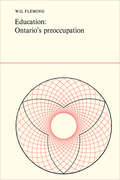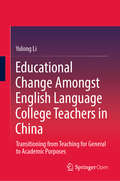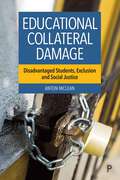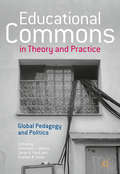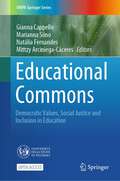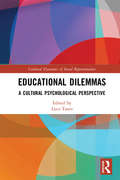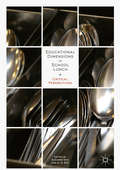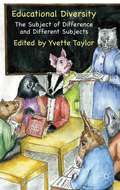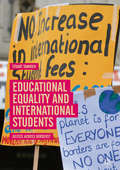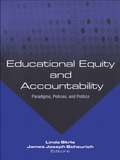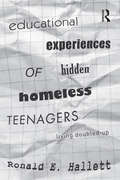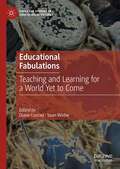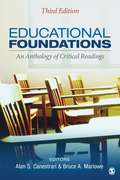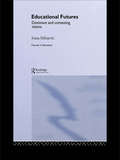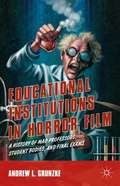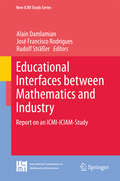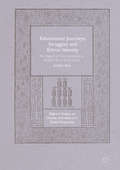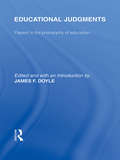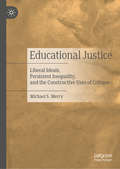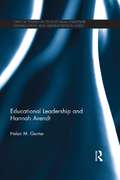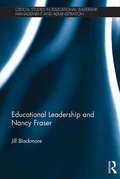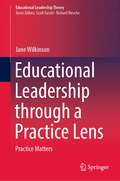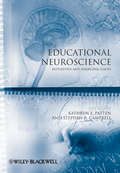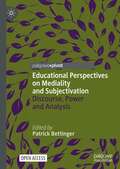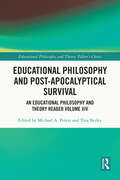- Table View
- List View
Education: Ontario's Preoccupation
by W. G. FlemingEducation: Ontario's Preoccupation, a companion to the author's seven-volume series, ONTARIO'S EDUCATIVE SOCIETY, reviews the main highlights of educational development in Ontario, concentrating on interpretation rather than statistics. Written for everyone seriously interested in education, whether specialist or general reader, this volume provides an analysis and overview of the key issues that have arisen in education in the last decade and evaluates the prospects for formal education in the future. Among the topics Professor Fleming discusses in detail in this volume are the role of formal education, the expansion of the educational system, the quest for organizational efficiency, the relationship between the province and the universities, educational agencies outside the formal system, research and development, the financing of education, and the questions of religion and language. Education: Ontario's Preoccupation is indispensable as an introduction to the series ONTARIO'S EDUCATIVE SOCIETY, and provides in one volume a compendium of facts and analysis of the main issues in the province's educational development.
Educational Change Amongst English Language College Teachers in China: Transitioning from Teaching for General to Academic Purposes (Springerbriefs In Education Ser.)
by Yulong LiThis open access book provides anthropological insights into the arduous yet rewarding journeys involved in selected TESOL teachers’ pedagogical transition to teaching English for Academic Purposes (EAP) at universities in Shanghai, the largest metropolitan area in China. Applying a unique combination of ethnography and phenomenology, the book offers innovative new perspectives on teacher education research. Drawing on the latest language education theory, it outlines a practitioner-friendly approach to EAP literacy. Teacher readers will especially benefit from the case studies presented here, which provide role models for teacher change in educational reform, as well as advice on their academic careers. In addition to addressing a timely and important research gap on EAP teachers in non-Western countries, the book is the ideal choice for readers interested in an update on English education in China.
Educational Collateral Damage: Disadvantaged Students, Exclusion and Social Justice
by Anton McLeanWhy do disadvantaged students continue to get a poor deal as they progress through England’s education system? Challenging orthodox thinking about school exclusion, this book powerfully advocates for a fairer education system for disadvantaged students. It argues that the current conceptualisation of ‘exclusion’ – physically removing the student from the school – is insufficient. This approach fails to recognise the layers of exclusion that these students encounter. Students can be excluded within their schools (inner exclusion), not just from school (outer exclusion). Drawing on student experiences of exclusion and the perspectives of senior leaders, including the author who is a Head of School, this book demonstrates how we can create a fairer education system for disadvantaged students.
Educational Commons in Theory and Practice: Global Pedagogy and Politics
by Alexander J. Means Derek R. Ford Graham B. SlaterIn this volume, critical scholars and educational activists explore the intricate dynamics between the enclosure of global commons and radical visions of a common social future that breaks through the logics of privatization, ecological degradation, and dehumanizing social hierarchies in education. In its institutional and informal configurations alike, education has been identified as perhaps the key stake in this struggle. Insisting on the urgency of an education that breaks free of the bonds of enclosure, the essays included in this volume weave together bright threads of radical thought into a vivid tapestry illustrating a critical framework for enacting a global educational commons.
Educational Commons: Democratic Values, Social Justice and Inclusion in Education (UNIPA Springer Series)
by Natália Fernandes Gianna Cappello Marianna Siino Mittzy Arciniega-CáceresThis open access book presents the final findings from the case studies developed within the Horizon 2020 SMOOTH project Educational Spaces. Passing through Enclosures and Reversing Inequalities through Educational Commons. The overall objective of the project was to understand, develop, and accelerate the potential impact of education on reversing inequalities for active social inclusion of children and young people at risk in Europe, through introducing the emergent paradigm of the “commons” as an alternative value and action system in the field of education (preschools, schools, and after-school programs). SMOOTH critically draws out the implications of the commons for refiguring education and for social change in general, on a footing of equality, sharing, participation, togetherness, caring, and freedom. Universities, research laboratories, municipalities, NGOs, museums, and youth organizations, in different European countries, have worked together to achieve the aboveaim involving almost 200 educators and teachers, and 800 children, and providing interesting insights and suggestions on how to implement educational commons in many different educational contexts. The target audience comprises policymakers and education leaders, students from Education and Communication degrees, researchers, and educators from both formal and non-formal educational contexts.
Educational Dilemmas: A Cultural Psychological Perspective (Cultural Dynamics of Social Representation)
by Luca TateoEducational Dilemmas uses cultural psychology to explore the challenges, contradictions and tensions that occur during the process of education, with consideration of the effect these have at both the individual and the collective level. It argues that the focus on issues in learning overlooks a fundamental characteristic of education: that the process of educating is simultaneously both constructive and disruptive. Drawing on research from Europe, America and Asia, chapters in this volume present and analyse different experiences of the tension between disruption and construction in the process of education. Situating educational discontent within the wider context, the book demonstrates how this issue can be exacerbated by the tension between the commodification and democratisation of educational systems. This book demonstrates that these issues permeate all levels of education and, as a result, emphasises how vital it is that educational discontent is considered from a new perspective. Educational Dilemmas is essential reading for academics, researchers and postgraduate students in the fields of psychology and education. It should also be of great interest to school psychologists, teachers and therapists.
Educational Dimensions of School Lunch: Critical Perspectives
by A. G. Rud Suzanne RiceSchool lunch is often regarded as a necessary but inconvenient distraction from the real work of education. Lunch, in this view, is about providing students the nourishment they need in order to attend to academic content and the tests that assess whether content has been learned. In contrast, the central purpose of this collection is to examine school lunch as an educational phenomenon in its own right. Contributing authors—drawing from a variety of disciplinary traditions, including philosophy, sociology, and anthropology—examine school lunch policies and practices, social and cultural aspects of food and eating, and the relation among school food, the environment, and human and non-human animal well-being. The volume also addresses how school lunch might be more widely conceptualized and practiced as an educational undertaking.
Educational Diversity
by Yvette TaylorThis collection explores the relationship between new equality regimes and continued societal inequalities, exploring change, ambivalence and resistance specifically in relation to compulsory and post-compulsory education, seeking to more fully situate the educational journeys and experiences of staff and students.
Educational Equality and International Students: Justice Across Borders?
by Stuart TannockIn an increasingly globalised educational landscape, this book examines whether the principle of educational equality can be applied across nation state borders. Exploring the tension between the theory of educational equality and the reality that most educational institutions are rooted in local communities and national frameworks, the author thus probes the consequences for institutions, individuals and communities as the number of international students grows exponentially. A topic that has previously received limited attention, the author draws upon theoretical literature and an empirical study of how universities in the United Kingdom conceptualise and promote principles of educational equality for international as compared with home students. This pioneering work will be interest and value to students and scholars of international education, international students, educational equality and globalisation, as well as practitioners and policy makers.
Educational Equity and Accountability: Paradigms, Policies, and Politics (Studies in Education/Politics)
by Linda Skrla James Joseph ScheurichDespite the intense political attention that has been focused on accountability, on standardized testing, and on the equity effects of both accountability and testing, the great majority of recent debate in education policy circles has failed to attend to either the dynamism or complexity of these issues and has, instead, been carried out in a dualistic, good versus evil, fashion. In contrast, the scholarship collected in this important new volume is designed to move beyond the prevailing dualism and to push the discourse about accountability, testing, and educational equity in public schools usefully forward, and to provide a much-needed resource for researchers, policy makers, and practitioners.
Educational Experiences of Hidden Homeless Teenagers: Living Doubled-Up
by Ronald E. HallettHomeless youth face countless barriers that limit their ability to complete a high school diploma and transition to postsecondary education. Their experiences vary widely based on family, access to social services, and where they live. More than half of the 1.5 million homeless youth in America are in fact living "doubled-up," staying with family or friends because of economic hardship and often on the brink of full-on homelessness. Educational Experiences of Hidden Homeless Teenagers investigates the effects of these living situations on educational participation and higher education access. First-hand data from interviews, observations, and document analysis shed light on the experience of four doubled-up adolescents and their families. The author demonstrates how complex these residential situations are, while also identifying aspects of living doubled-up that encourage educational success. The findings of this powerful book will give students, researchers, and policymakers an invaluable look at how this understudied segment of the adolescent population navigates their education.
Educational Fabulations: Teaching and Learning for a World Yet to Come (Palgrave Studies in Educational Futures)
by Sean Wiebe Diane ConradThis highly original collection presents speculative fiction as fiction-based research to re-imagine education in the future. Given the particular convergence of economic and governmental pressures in educational institutions today, schools represent imaginative sites especially well-suited to interrogation through an SF lens. The relevance for education of the exploration and interrogation of themes related to technology, human nature, and social organization is evident; yet the speculative fiction approach is unique in its harnessing of creative capacities to envision alternatives. The contributions in this collection are generated from educational experience and research, drawing on scholarship in curriculum studies and teacher education and on the authors' experiences and imaginations as teachers, teacher educators, educational scholars, and human beings.
Educational Foundations: An Anthology of Critical Readings
by Alan S. Canestrari Bruce A. MarloweFULL DESCRIPTION Why Teach? Who Are Today's Students? What Makes a Good Teacher? Educational Foundations: An Anthology of Critical Readings answers these questions and more, providing an exciting alternative to other foundations textbooks. This anthology is aimed at students about to enter the teaching profession, those new to the profession, and anyone interested in carefully examining--and improving--schools and schooling. In this Third Edition, editors Alan S. Canestrari and Bruce A. Marlowe add new essays by classic and contemporary policy shapers and teachers. The readings are bold and refreshing, and their authors eschew unquestioning compliance. By taking a hard look at traditional educational practice, the contributors to this anthology serve as models for the kind of reflective practitioners that its editors hope that students will become while in the field.
Educational Futures: Dominant and Contesting Visions (Educational Futures Ser. #21)
by Ivana MilojevicThis book provides an overview and analysis of current tensions, debates and key issues within OECD nations, particularly Australia, the USA, Canada and the UK, with regard to where education is and should be going. Using a broad historical analysis, it investigates ideas and visions about the future that are increasingly evoked to support arguments about the imminent demise of the dominant modern educational model. Focusing neither on prediction nor prescription, this text suggests the goal is an analysis of the ways in which the notion of the future circulates in contemporary discourse. Five specific discourses are explored: globalisation; new information and communications technologies; feminist; indigenous; and spiritual. The book demonstrates the connections between particular approaches to time, visions of the future, and educational visions and practices. The author asserts that every approach to educational change is inherently based on an underlying image of the future.
Educational Institutions in Horror Film: A History of Mad Professors, Student Bodies, and Final Exams
by Andrew L. GrunzkAn exploration of how educational institutions have been portrayed in horror film, this book examines the way that scary movies have dealt with the issue of school violence, focusing on movies set in high schools, colleges, and summer camps.
Educational Interfaces between Mathematics and Industry
by Alain Damlamian José Francisco Rodrigues Rudolf SträßerThis book is the "Study Book" of ICMI-Study no. 20, which was run in cooperation with the International Congress on Industry and Applied Mathematics (ICIAM). The editors were the co-chairs of the study (Damlamian, Straesser) and the organiser of the Study Conference (Rodrigues). The text contains a comprehensive report on the findings of the Study Conference, original plenary presentations of the Study Conference, reports on the Working Groups and selected papers from all over world. This content was selected by the editors as especially pertinent to the study each individual chapter represents a significant contribution to current research.
Educational Journeys, Struggles and Ethnic Identity
by Xinyi WuThis book examines how state schooling in China has economically, culturally, and ideologically had an impact on and gradually transformed a traditional Muslim Hui village in rural Northwestern China. By discussing the interpretation and appropriation of dominant educational discourse of "quality" in the rural context, it illustrates the dichotomies of poverty and prosperity, civility and uncivility, and religiosity and secularity as they are perceived and understood by teachers, parents and students. Based on an original ethnographic research conducted in a secondary school, it further touches upon Muslim Hui students' negotiations of filial, rural, and ethnoreligious identities when they struggle to seek a life of their own in the journey to prosperity. The book introduces audiences to multiple ways in which Muslim Hui students construct and negotiate identities through state schooling, especially the educational heterogeneity experienced by various Muslim youth. It also captures the changing rural-urban dynamic as state schooling continues to guide local formal educational activities as well as create tensions and confusions for both teachers and parents. Most importantly, the book challenges stereotypes about Muslim Hui students in Northwest China being assimilated into the mainstream culture by demonstrating how local Muslims live, study, pray, and fulfil the five pillars of Islam. It will be highly relevant to students and researchers in the fields of education, anthropology, sociology, and religious studies.
Educational Judgments (International Library of the Philosophy of Education Volume 9): Papers in the Philosophy of Education
by James F. DoyleThe topics covered in this volume, originally published in 1973, include the need for a more adequate concept or definition of education, the issue of whether indoctrination is compatible with education, particularly with moral education, and the processes of judging the merits of different approaches to aesthetic education. Two contributors present complementary analyses of the relations between freedom as a characteristic of institutions and the process of learning to be a free man. There is discussion of the neglected subject of rights and duties in education, with special emphasis on the question of a universal right to education. The volume concludes with papers on the relevance of philosophy to the practical judgments of educators and to education as a field of study.
Educational Justice: Liberal Ideals, Persistent Inequality, and the Constructive Uses of Critique
by Michael S. MerryThis book examines the philosophical, motivational, and practical challenges of education theory, policy, and practice in the twenty-first century. There is a loud and persistent drum beat of support for schools, for citizenship, for diversity and inclusion, and increasingly for labor market readiness with very little critical attention to the assumptions underlying these agendas, let alone to their many internal contradictions. Merry does not neglect the historical, comparative international context so essential to better understanding where we are, as well as what is attainable in terms of educational justice. He argues that we must constructively critique some of our most cherished beliefs about education if we are to save the hope of real justice from the rhetoric of imagined justice.
Educational Leadership and Hannah Arendt (Critical Studies In Educational Leadership, Management And Administration Ser.)
by Helen M. GunterThe relationship between education and democratic development has been a growing theme in debates focussed upon public education, but there has been little work that has directly related educational leadership to wider issues of freedom, politics and practice. Engaging with ELMA through the work of Hannah Arendt enables these issues of power to be
Educational Leadership and Nancy Fraser: Nancy Fraser And Iris Marion Young (Critical Studies in Educational Leadership, Management and Administration)
by Jill BlackmoreDrawing on the work of Nancy Fraser, this book offers a critical view of contemporary educational leadership and reform discourses, exploring how her key concepts of redistribution, recognition and representation may apply to social and therefore educational justice. Fraser offers a political and pragmatic reconciliation between feminist, neo-Marxist, critical and post-structuralist theories. This book outlines how Fraser has worked on and worked over theories of social justice and how this can inform how we can understand educational theory, policy and practice generally. In particular, the book focuses on the field of educational administration and leadership (ELMA) as it relates to equity issues such as school choice and inequality, gender and inclusive leadership, and alternative schooling. Fraser’s argument about ‘scaling up’ social justice theory is shown to be highly salient given the emergence of the field of transnational education policy and its role in the context of intensified nation-state and edu-business competition. Overall, through the lens of Nancy Fraser’s unitary framework, this book considers epistemological questions about the nature of knowledge, examines the relationship between the state, the individual, education and social movements, addresses the difficulties and dilemmas which arise due to the intersections of gender, class, race, sexuality and culture in a globalized context, and illustrates how the principles of social justice can be mobilized by leaders in everyday practice. Educational Leadership and Nancy Fraser is an illuminating read for those policymakers, researchers and practitioners engaged in the field of educational administration, leadership and social justice.
Educational Leadership through a Practice Lens: Practice Matters (Educational Leadership Theory)
by Jane WilkinsonThis book provides the theoretical and analytical resources for an urgent rethinking of the social project of educating and educational leading. It examines what educational leadership is, namely the politics and power of leadership as a practice, and what it can and should be, offering a pedagogical and praxis-informed approach to educational practice. Drawing on research conducted at various Australian schools and education districts, it argues for a reframing of educational leadership as pedagogical practice/praxis to transform theorising and practice in the field. The book provides a rich account of educational leading through a practice lens, bringing into dialogue the theory of practice architectures with site ontologies, Bourdieu’s thinking tools and feminist critical scholarship.The book tracks the practices and praxis of educational leaders as they grapple with the changing landscape and forces of educational policies that have informed Australian education. It reimagines education leadership by integrating Continental and Northern European understandings of pedagogy and praxis as being morally and ethically informed, as opposed to the narrower Anglophone notions of pedagogy as teaching and learning. The book adds to the body of knowledge on the “actual work of leadership” as a “distinct set of practices” that is morally and ethically informed. Readers will find a more holistic understanding of educational leadership practice and praxis, based on the everyday accounts of educational leaders, teachers and students in schools and education districts.
Educational Neuroscience: Initiatives and Emerging Issues (Educational Philosophy and Theory Special Issues #25)
by Kathryn E. Patten Stephen R. CampbellEducational Neuroscience provides an overview of the wide range of recent initiatives in educational neuroscience, examining a variety of methodological concerns, issues, and directions. Encourages interdisciplinary perspectives in educational neuroscience Contributions from leading researchers examine key issues relating to educational neuroscience and mind, brain, and education more generally Promotes a theoretical and empirical base for the subject area Explores a range of methods available to researchers Identifies agencies, organizations, and associations facilitating development in the field Reveals a variety of on-going efforts to establish theories, models, methods, ethics, and a common language
Educational Perspectives on Mediality and Subjectivation: Discourse, Power and Analysis (Palgrave Studies in Educational Media)
by Patrick BettingerThis open access book examines the complex relationship between education, media and power. Exploring the entanglement of education media and power structures, the contributions use various examples and case studies to demonstrate how subjectivation processes and digital structures interact with one another. The book asks which modes of subjectivation can be identified with current media cultures, how subjects deal with the challenges and potential of digitality, and how coping and empowerment strategies are developed. By addressing theoretical as well as empirical evidence, the chapters illuminate these connections and the subsequent significance for media education more widely.
Educational Philosophy and Post-Apocalyptical Survival: An Educational Philosophy and Theory Reader Volume XIV (Educational Philosophy and Theory: Editor’s Choice)
by Michael A. Peters Tina BesleyThis collection concerns educational philosophy and post-apocalyptical survival. This 14th volume in the Editor's Choice series provides insights into the philosophy of education as it relates to the concepts of civilizational collapse, discourses of decline, educating for survival amid climate emergency, cultural apocalypse and the pandemic. It is based on a series of editorials and articles published in the Educational Philosophy and Theory journal through its 55-year history. The articles, written by Editor Michael Peters and colleagues, explore the concept of global apocalypse from the educational philosophy lens. It will be of interest to scholars in philosophy of education and anyone who is working in the field of post-apocalyptic studies.
